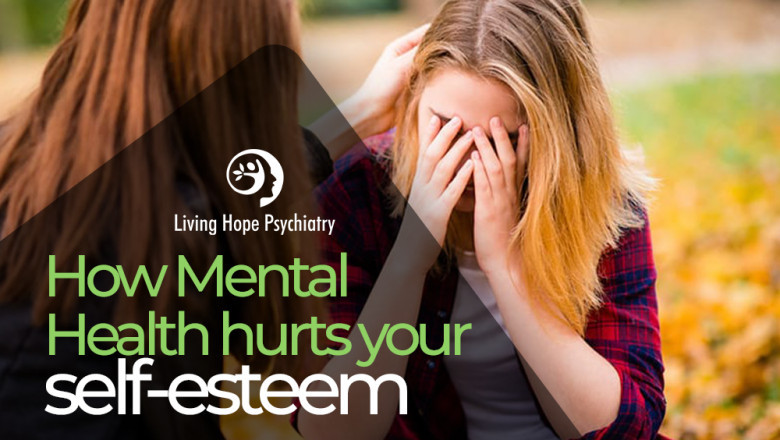views

A person’s perception of oneself is what is meant by self-esteem. A healthy level of self-esteem is a crucial component of a mentally healthy person. People who have good self-esteem have a favorable opinion of themselves and cherish the things they have accomplished.
People who have low self tend to feel sad or dissatisfied with themselves most of the time, even though everyone has periods of low confidence from time to time. Moreover, a significant body of prior research suggests that decreased levels of self-esteem typically accompany mental problems.
Nevertheless, the basis of the connection between low self-esteem and mental disease is not fully understood at this time. It is not yet known whether low self-esteem is a symptom of a limited number of mental disorders mainly unique to those disorders or whether it is simply indicative of poor psychological health regardless of the diagnosis.
What are some potential reasons for poor self-esteem?
The factors that impact our sense of self-worth are unique to each individual. For example, you can experience a sudden shift in your self-esteem, or you might have struggled with low self-esteem for some time. Either of these scenarios can make it challenging to identify how you feel and make adjustments.
Some of the numerous factors that might contribute to poor self-esteem are as follows:
- A condition that lasts for an extended period, such as persistent pain, a severe illness, or a physical disability.
- A loss of confidence is the natural consequence of poor academic achievement.
- An ongoing difficult life occurrence such as the dissolution of a relationship or ongoing difficulties with finances.
- Financial or housing issues
- Having issues at work or school can also be a source of stress.
- Having trouble finding work or losing your job can be a source of ongoing stress.
- Illnesses of the mind, such as anxiety disorders and depression.
- Adverse treatment from a partner, parent, or caregiver, such as being in an abusive relationship or receiving neglectful parenting.
- Problems with one’s mental health.
- Problems with one’s physical health.
- Relationship issues, such as breaking up or divorcing.
- Undergoing bias, unequal treatment, or stigma, such as racism, getting bullied, or being abused.
- Unhappy childhood in which significant others (such as parents or teachers) had a prominent role and were exceedingly critical.
- Worries about your physical appearance and how you see yourself.
Is having poor self-esteem considered a mental health issue?
Although having poor self-esteem does not in and of itself constitute a mental health disorder, there is a strong correlation between the two. If a variety of factors negatively impacts your self-esteem over a prolonged period, you may develop mental health issues such as anxiety or depression.
Some events associated with low self-esteem may be symptoms of a mental health disorder, especially if they continue for a significant amount of time or impact your day-to-day life. Because there is data that links low self-esteem to problems with mental health and a poor quality of life, this is a potentially harmful way to live one’s life. The following is a short list of how low self-esteem may negatively impact mental health, as well as some suggestions for how you might work to enhance your own:
Addiction
Inadequate levels of self-esteem in childhood years or adulthood have been linked to an increased likelihood of developing an addiction in later life. As a result, many people who struggle with addiction turn to drugs or alcohol to dull the pain of the bad sentiments they get about themselves. However, with time, this way of escape evolves into an addiction, which, of course, has adverse repercussions on the already low levels of self-esteem that the individual has.
Depression and anxiety
Low self-esteem and other mental health issues, such as anxiety and depression, are strongly correlated, which may perpetuate the problem. It is difficult to determine which occurs first; what is certain is that the combo is not only frequent but also problematic. Someone already struggling with a mental disorder may discover that they acquire poor self-esteem due to the societal stigma associated with mental illness. The perpetuation of stigma may give people the sensation that they have failed somehow.
Poor Relationships
As human beings, we naturally need to engage in social activity. The connections we maintain with our family, friends, and coworkers help shape who we are as individuals. Therefore, unfavorable relationships will eventually lead to negative sentiments and a negative image of who we are.
Developing better self-esteem
Any person may boost your sense of self-worth by doing the following:
- Celebrate the little moments that make up your life, and congratulate yourself on even the most insignificant of your accomplishments.
- Get some exercise; it might make you feel better overall.
- It is much simpler to have a cheerful attitude when engaging in activities that you find pleasurable.
- Spend time with individuals who won’t drag you down, and consider volunteering your time to assist others; doing so may help you develop a more positive attitude about yourself.
- Stop berating yourself when you screw up since errors are human nature, and everyone does it.
- Think about the things you can alter, and don’t worry about the things you can’t change. Avoid striving to accomplish everything perfectly since this is not possible. Think about the things that you can change.
- Your negative thinking must be challenged; explore other possible answers, and try to see things from their proper perspective.












